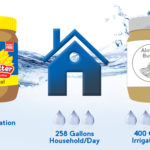< Back to Blog Posts
Sustainability & SunButter

The idea for Earth Day came to Gaylord Nelson, a U.S. Senator from Wisconsin, who hoped to channel more energy into environmental protection. On April 22,1970, 20 million Americans from all backgrounds – rich and poor, rural and urban, Republican and Democrat – embraced the spirit of the movement demonstrated for a healthy, sustainable environment.[1] Today, Earth Day is the largest secular observance in the world. It is celebrated by more than a billion people in 192 countries.
At SunButter, we are proud to do our small part to further the goals of this movement by making a product that is both healthy and sustainably produced. SunButter is a delicious spread made from sunflower seeds, an environmentally friendly crop. Our farmers harvest a substantial amount of sunflower seeds, averaging a yield of sunflower kernel between 700-900 LBS per acre. Heat- and drought-tolerant, sunflowers are resilient and easy to grow.[2] We are also proud to note the production of our product comes with very little waste. For example, when sunflower seeds are being processed into kernel for SunButter, their seed hulls are sold to local turkey farmers for bedding.
Water is an extremely valuable commodity, and the sunflower crop grown in our region to produce SunButter relies completely on snow pack, rain fall, and moisture stored within the soil profile. Irrigation is unnecessary. The deep root system of the sunflower reaches the full measure of moisture and nutrients in the soil. Sunflowers are an excellent rotational crop, often used to pull up nutrients washed deep down into the soil.
Because SunButter has similar applications to other nut butters, it is natural to wonder how its production compares when it comes to sustainability. For instance, Almonds are very popular, but require a massive amount of water to produce, an issue that received increased attention during California’s recent drought. According to the California Almond Board, their crops use 3.29 million acre feet of water in a year. There are 325,851 gallons per acre foot, so almond production requires 1,072,049,790,000 gallons of water annually.[3] California Almonds use 9.5% of the agricultural water in California. The total water used in agricultural irrigation in California is 29.6 million acre feet or 8,667,636,600,000 gallons. At the same ratio, 9.5% of the total agricultural irrigation in California would equate to 823,425,477,000 gallons used to irrigate almonds. There were 2.05 billion pounds of almond (nut meats) produced in 2016.[4] This calculates to 402 gallons of irrigated water per one pound of almonds versus zero gallons of irrigated water to produce the one pound of sunflower kernel used to make one jar of SunButter. What a difference!
For those who care deeply about how their food choices impact the environment in both obvious and subtle ways, SunButter is the sustainable, delicious choice. Besides being a great source of plant based protein, SunButter also provides many nutrients found in sunflower seeds such as; Vitamin E, Iron, Niacin, Vitamin B6, Folate, Phosphorous, Magnesium, Zinc, and Copper.
To learn more about how SunButter serves our planet, visit sunbutter.com today! To find out how to celebrate Earth Day in your community on April 22, visit EarthDay.org.
[1] http://www.earthday.org/about/the-history-of-earth-day/
[2] www.sunflowernsa.com
[3] http://cdec.water.ca.gov/cgi-progs/reports/PRECIPOUT
[4] https://www.nass.usda.gov/Statistics_by_State/California/Publications/Fruits_and_Nuts/2016/201606almom.pdf
[Graphic: Household daily water use] Average family uses 80-100 gallons per day. Source: https://water.usgs.gov/edu/qa-home-percapita.html. Average household size 2.58. Source: https://www.census.gov/prod/cen2010/briefs/c2010br-14.pdf




Make It With
SunButter






Make It With SunButter





